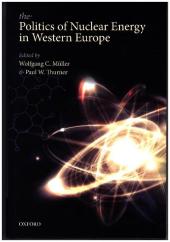 Neuerscheinungen 2017Stand: 2020-02-01 |
Schnellsuche
ISBN/Stichwort/Autor
|
Herderstraße 10
10625 Berlin
Tel.: 030 315 714 16
Fax 030 315 714 14
info@buchspektrum.de |

Wolfgang C. Müller, Paul W. Thurner
(Beteiligte)
The Politics of Nuclear Energy in Western Europe
Herausgegeben von Müller, Wolfgang C.; Thurner, Paul W.
2017. 400 S. 240 mm
Verlag/Jahr: OXFORD UNIVERSITY PRESS; OUP OXFORD 2017
ISBN: 0-19-874703-9 (0198747039)
Neue ISBN: 978-0-19-874703-1 (9780198747031)
Preis und Lieferzeit: Bitte klicken
A comprehensive analysis of nuclear energy policies in the key Western Europe countries over the entire post-war period.
This volume investigates nuclear energy policies in Western Europe over the entire post-war period, but with special attention to the two most recent decades. The comparative analytical perspective draws on the interplay between voters´ attitudes, challenging movements, party competition, and coalition formation. Spanning more than 60 years and 16 countries, the researchers examine the underlying causal processes leading to the observed varieties of Western European
nuclear energy policies. Based on a mixed methods approach using both structured case studies as well as quantitative analyses, the study shows that the nature of party competition under given institutional contexts is a key-driver for, as a rule, tactically motivated governmental policy changes and
stability, respectively.
Part I introduces the practical and theoretical relevance of the topic. It outlines the reasoning of the major scientific contributions with regard to nuclear energy policies, and offers a theoretical alternative to the previous literatures that has been predominantly movements-oriented. Additionally, it provides core economic and political indicators of the changing role of nuclear energy in the countries. Part II consists of seven in-depth case studies where the outlined theoretical
perspective is applied. Part III consists of a general summary, short narratives of the countries not covered in case studies, qualitative comparison and an assessment of the factors for policy change from multivariate analysis.
Thanks to its analytical rigour and the richness of the empirical material collected, this book will surely become a reference for the increasing number of political scientists working on energy politics and policy. One may also hope that it will help foster the use of comparative politics methods in the field of energy, since they have great potential for deepening our understanding of one of the defining issues of our times: low carbon energy transitions in Europe and beyond Pierre Bocquillon, JMCS


